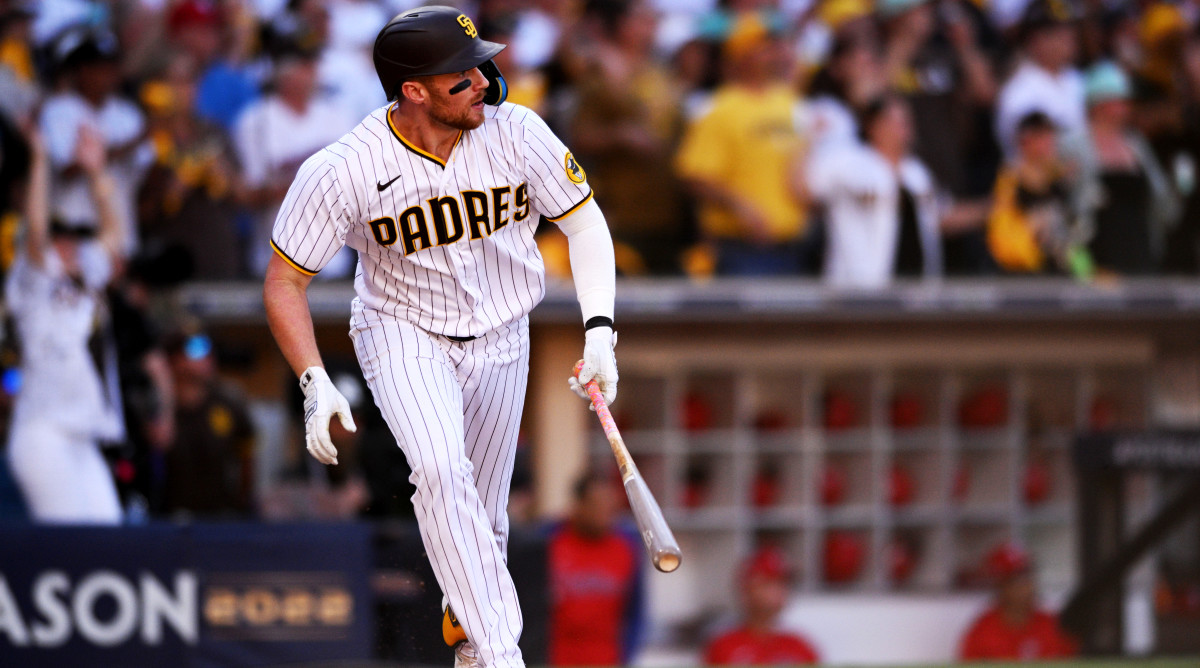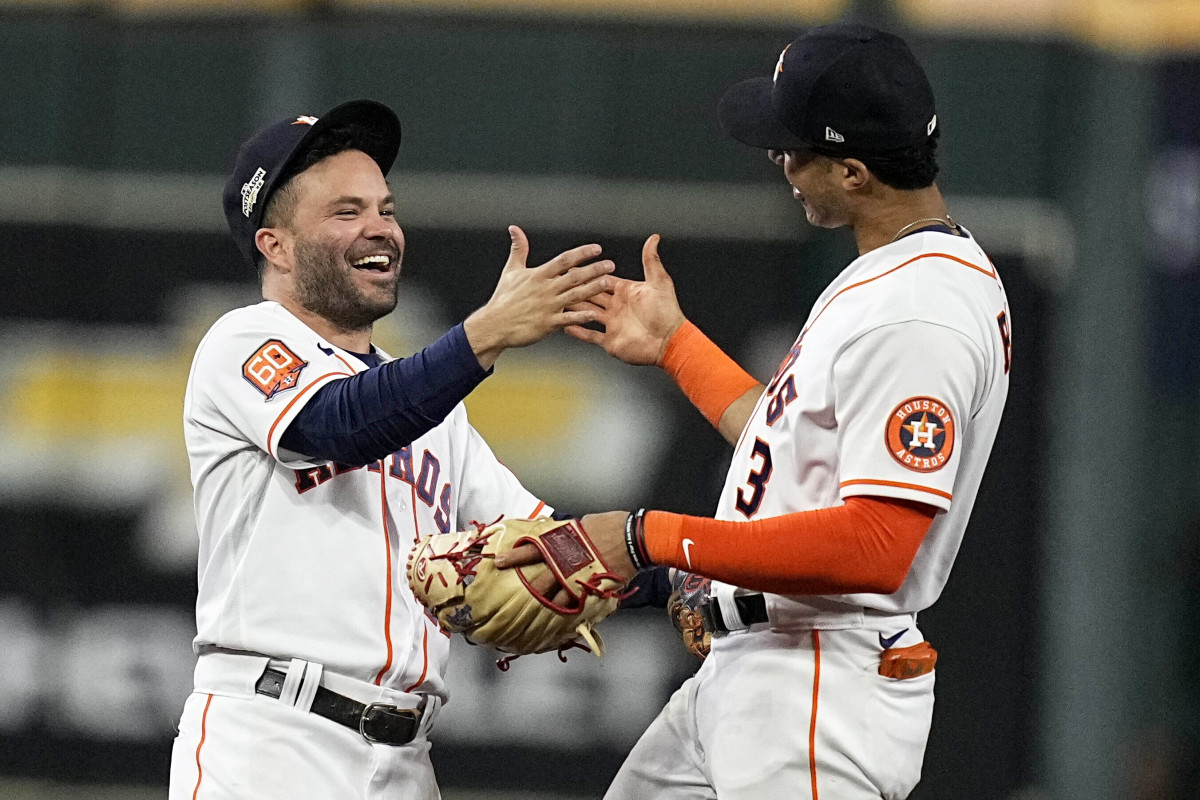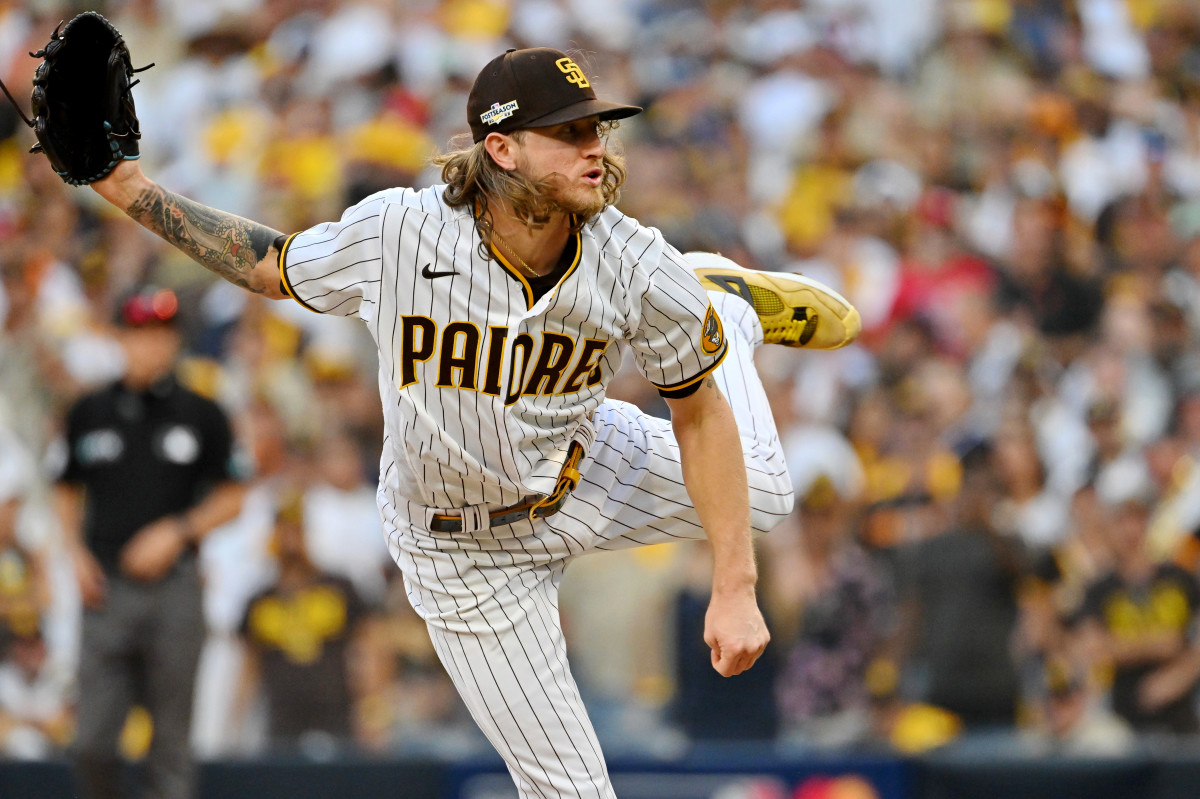The Padres Strike Back to Set Stage for Epic Postseason Series

Things looked bleak in San Diego during the top of the second inning in yesterday’s NLCS Game 2 between the Padres and Phillies. San Diego had Blake Snell on the mound facing a Philadelphia lineup that was soft-contacting its way to a 2–0 series lead. Even the sun gods were smiling upon this Team of Destiny.
Bryce Harper fought off a tough two-strike offering into shallow left-center for a leadoff single. Nick Castellanos blooped a single into short right field. Alec Bohm sent a floating liner into right for an RBI single, and advanced to second on a throwing error. After a strikeout, the sun gods made their presence felt, when Matt Vierling skied one to deep right field, which should’ve been a sac fly for the second out—and the second run—but Juan Soto lost the ball in the early afternoon San Diego sun, allowing Castellanos to score, Bohm to advance to third and Vierling to reach second for a double without an out being recorded. Edmundo Sosa looped another soft single to bring home Bohm and then Vierling scored on a Kyle Schwarber groundout.
The Phillies scored four runs on five hits, only one of which—naturally, the sunball—was hit hard. It was the type of demoralizing rally that could’ve buried an opponent. Instead, the Padres smacked back. Leading off the bottom of the second, Brandon Drury ripped a low-hanging, hooking missile that somehow stayed up long enough to get over the left-field wall. Josh Bell followed with a majestic, towering dinger that was the aesthetic opposite of Drury’s liner. Just like that, the Friars cut the lead in half.
Snell settled into a groove for his next three innings—though it’s hard to say he wasn’t pitching well when the Phillies were BABIPing their way to four runs.
At some point in the bottom of the fifth inning, I can’t remember exactly when, I texted Emma Baccellieri and said, “The Fifth Inning From Hell,” a nod to her column after the Phillies scored six runs in the ninth to beat the Cardinals in the first game of the NL wild-card round. But also because, well, this was a catastrophic half-inning for Philadelphia.
I won’t go into too much detail here about all the things that went right for San Diego in the fifth—you can read more about the inning in the postgame columns by Emma and Tom Verducci—but by the time Aaron Nola was yanked with two outs in the inning, the game was tied 4–4 and the Phillies had runners on second and third. Lefthander Brad Hand came in to face lefty Jake Cronenworth … and plunked him with a 2–2 slider to load the bases. Hand had to stay in to face Drury, who slugged .626 against southpaws this season, and as you’d expect, it didn’t go well for Philly. Drury lined a two-run single to center, and then Bell, now batting right-handed, rocketed a single down the right-field line to plate the final run of the inning. Everything shifted so suddenly that all we could do was wonder how this Team of Destiny could be subjected to such a cruel twist of Phillies Phate.
Then, after dwelling on the prospect of damnation and seeing the rest of the game play out (San Diego won, 8–5), it became clear that for the most part, the Phillies didn’t lose the game so much as the Padres won it. Philadelphia didn’t make any errors, and while Nola didn’t have his best stuff, he also was nowhere near his worst. The San Diego sluggers, especially the three acquired at the trade deadline (Soto, Drury and Bell), just put some great swings on his pitches; Soto’s game-tying double was a masterwork display of a player getting his hands inside the baseball on a difficult inside heater to barrel it and keep it fair. The only questionable call was manager Rob Thomson bringing in Hand against Cronenworth with lefty-killer Drury on deck. Thomson either should have gone to one of his higher-leverage relievers here, or he should’ve left Nola in to intentionally walk Cronenworth and face Drury. Still, Thomson didn’t lose the game there. The momentum had already completely flipped to San Diego, and that was of the Padres’ doing.
As Verducci wrote in his postgame column, “The nine-batter sequence included two-strike hits by Austin Nola, Soto and Drury and the two-strike hit by pitch of Cronenworth. The Padres are not going quietly.” From everything we’ve seen so far, this isn’t the last we’ve heard from the Phillies either. This has the makings of a series of the ages, with plenty of stars and talented, well-managed teams that have caught fire at the perfect time. It’s a shame we have to wait until tomorrow to see what happens in the next installment of this thrilling saga.
Have any questions or comments for our team? Send a note to mlb@si.com.
1. THE OPENER

“If you want to discuss whether the newly expanded playoffs make it hard for favorites to win, you’ll have to speak up. They can’t hear you over the sound of the home run train at Minute Maid Park.”
I don’t think there is a baseball writer in the country who is better at the punchy lede than Stephanie Apstein. In her column from Houston’s ALCS Game 1 win over the Yankees, she lays out why the Astros remain the best organization in the American League.
Houston’s Haters Are Running Out of Ammo by Stephanie Apstein
The Astros’ long-standing success can’t be attributed to any one thing, whether it’s a tank job or cheating scandal now quite far in the past. It’s about everything.
2. ICYMI
Let’s get you caught up on our other stories from last night.
Juan Soto Issued a Warning Shot. The Phillies Better Beware. by Tom Verducci
The hitting prodigy has yet to find his groove with the Padres. But in Game 2 of the NLCS, he showed signs that he could carry San Diego to the World Series.
Inside Austin Nola’s Long Journey to Face His Brother in the NLCS by Emma Baccellieri
The Padres catcher and Phillies ace matched up with Game 2—and family bragging rights—on the line.
If you want to learn more about Astros’ Game 2 starter Framber Valdez, who was one of the best pitchers in baseball this year, you should check out this story from September:
The Unexpected Greatness of Framber Valdez by Will Laws
The Astros’ lefty is making history and emerging as one of MLB’s best pitchers.
3. WORTH NOTING from Emma Baccellieri

Before this postseason, Josh Hader had never touched 100 mph in a game. (He’d hit 99.9, yes, but never triple digits.) Now? He’s done it six times, including once on Wednesday, with five of the six either going for strikes or getting fouled off. That underscores a terrifying point: As difficult as it already was to face Hader, it’s gotten even more difficult, because he’s been throwing harder than ever. Historically, his fastball averaged 95 or 96 mph. In 2022, the average has gone up to 97.4 mph—and that’s based on just the regular season. His October triple-digit flamethrowing comes only on top of that.
In other words, Hader’s rough patch from the period right before and after he was traded now feels like a distant memory. In 5⅓ postseason innings so far, Hader has allowed just two baserunners (one hit and one walk) and struck out 10. If Phillies hitters are afraid, well, they should be.
4. W2W4 from Nick Selbe
After striking out 17 times against Astros pitching in Game 1, the big question for today’s Game 2 is simple: Can the Yankees put the ball in play? They did so just 16 times in Wednesday’s 4–2 loss, with Giancarlo Stanton the only starter to not strike out at least once. In contrast, Houston hitters struck out just twice, representing the biggest discrepancy in team strikeout totals in MLB postseason history (courtesy of MLB.com’s Sarah Langs). Astros pitchers generated 27 swinging strikes—led by 17 from Justin Verlander—compared to just 11 from five different Yankees arms.
Enter Framber Valdez, Houston’s Game 2 starter who doesn’t generate a ton of strikeouts but was inarguably one of the best pitchers in the league this year. Valdez faced New York once during the regular season on June 23 and allowed just two hits over six innings (though one was a three-run homer by Stanton) with seven strikeouts. He’ll match up against Luis Severino, who lost both of his starts against Houston this season but pitched well in each, allowing five runs combined over 12 innings and 11 strikeouts. We won’t have two games on the same day again until Saturday, so let’s hope tonight’s game can bring enough drama on its own. It’s Yankees-Astros, so I’d say that’s a safe bet. The real question is: will the Yankees strike back like the Padres did in their second LCS game? I can’t wait to find out.
5. THE CLOSER from Emma Baccellieri
One thing I loved yesterday? This clip of 23-year-old Justin Verlander pitching against the Yankees in the playoffs in 2006 next to a clip of 39-year-old Verlander pitching against the Yankees in the playoffs on Wednesday. The adjustments he’s made to be as successful as he is at this age are nothing short of remarkable: What a joy to watch.
That’s all from us today. We’ll be back in your inbox tomorrow. In the meantime, share this newsletter with your friends and family, and tell them to sign up at SI.com/newsletters. If you have any questions or comments, shoot us an email at mlb@si.com.
